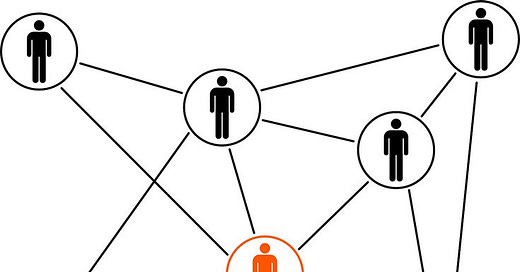Actor-Network Theory (ANT): Science and Society
In this instalment of laboratory life, we delve into the ANT; Latour explains Actor-Network Theory by highlighting the interactions of networks formed between scientists, instruments and other entities. In the production of knowledge, credit is often given only to scientists. There is no recognition for other entities, such as materials and instruments. Some say it is because they are inanimate. It is important that we move beyond this traditional narrative of isolated scientific discovery.
Human and non-human actors also play integral parts in the discovery process. For example, the accuracy and precision of instruments can influence results. These instruments and technologies are not mere tools but active participants in shaping society. In our everyday lives, networks are formed similarly to scientific settings. Individuals and entities come together to achieve specific goals.
We have collaborators who bring their unique skills and resources to help society function. People handling logistics, funding supplies, and operating equipment come together to make a successful event. The event's success depends on all human and non-human collective efforts. Doctors can make better diagnoses with their instruments, and engineers can make better calculations with theirs.
In all networks, there are some power dynamics at play. Some entities gain prominence based on their contributions and positions in the network. Power dynamics determine how decisions are made in the network. Understanding the power dynamics allows us to appreciate collaborative efforts that lead to successful outcomes.
"Science is not simply the discovery of truths that exist independently of researchers; it is the production of knowledge through the collective efforts of humans and non-humans alike."
If your goal is to rise to a significant position in your network or to enjoy more respect, building your reputation is just as important.
How do you do it?
Well, here are 5 things to keep in mind from Rohan on how to build your rep at work:
1. Value people’s time
Do you respect others' time by arriving on time, delivering tasks on time, and avoiding unnecessary meetings? The people in your network will notice. Also, let folks know when a meeting is optional so they have an easy way out if they don't need to go.
2. Ditch “buckets” where possible
There are two ways to collect water: you can grab a bucket and keep doing it repeatedly, or you can put in the effort to build a pump, which means you'll never need a bucket again.
Here are a few suggestions:
- Establish a centralized portal or knowledge base to store essential documents and address recurring questions.
- Introduce reusable templates for frequently created documents to streamline processes and save time for everyone involved.
If you want to earn recognition in your network, try to replace as many "bucket-jobs" with pumps as possible. By building these "pumps," you'll show that you're not just there to do the bare minimum but to make a lasting impact. That's how you build a strong reputation as a problem-solver.
3. Don’t wrestle with pigs
There’s an old saying: “Don’t wrestle with pigs. You’ll both get dirty, but the pig likes it.”
In other words, steer clear of office politics and drama. It offers no benefits and can lead to many problems. Instead, be the person who speaks positively about others when they're not around. When a colleague's name comes up, genuinely praise their work or character.
Engaging in office politics and gossip breaks down trust. But consistently being a positive voice? That’s how you build a reputation as someone reliable and enjoyable to work with.
4. Do your job
It’s obvious consistency is key in everything. Showing up daily and doing your best at your job is the best way to build a solid reputation.
5. Take ownership
In his book Extreme Ownership, Jocko Willink shares a story from his time leading an operation in Iraq. Things went south when two of his platoons radioed for backup under heavy fire. But the twist? Due to poor planning, they were accidentally firing at each other. Thankfully, no one was hurt, but it could've been disastrous.
During the debrief, his superiors were understandably upset and demanded to know who was responsible. Jocko stood up and said, "It was my fault. I'm the leader, and everything that happens rests with me."
What happened next? Instead of losing respect, Jocko gained more trust from his superiors and more respect from his team because he owned up to his mistakes instead of passing the blame.
Do you blame others? Or are you taking responsibility?
Here is a 6th point to this: a weekly update for your team leader.
6. Friday Highlights
It takes a few minutes but has the highest ROI. When you send weekly updates, you build trust, hold yourself accountable, help you track your goals and promote yourself. As an introvert, I've always found self-promotion to be a challenge.
Here is the template I use :
Subject: Weekly Highlights [Insert Date]
Hi [Name],
Happy Friday! Below are noteworthy tasks I’ve completed this week and priorities for next week.
Please feel free to not respond to my weekly updates. While I hope they’re helpful to you, they’re also helpful for my own reference.
This Week’s Highlights [Date-Date]:
Activities
-[List]
Next Week’s Priorities [Date-Date]:
Activities
-[List]
Thanks,
[Name]
Maintain an ongoing draft throughout the week to save time on Fridays.
Send your update every Friday before heading into the weekend.
The next Friday, reply in the same email thread and update the subject line with the new date.
Don't expect a response.
ANT challenges us to rethink traditional notions and highlights life's social and material dimensions. This understanding deepens our appreciation of the dynamics in societal interactions.






